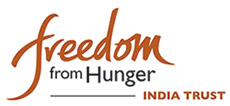

In his speech, Dr. Mehta expressed his joy at being the key note speaker on the occasion of the 35th Foundation Day of PRADAN. Congratulating PRADAN on this achievement he articulated that PRADAN is not just an organisation but an idea which exceeds itself. How would India’s developmental trajectory look like if the ideas PRADAN stood for and implemented were to become central to the developmental imagination at the level of the State and the society in general. While there have been appreciation of PRADAN’s work on the ground, there has seldom been any effort to take it to heart. PRADAN was a revolutionary force in thinking of the role of gender to development. Contextualising the role that gender based gaps have played in deterring India’s growth, he referred to the comparison with China.
Read MoreDiscussion round followed the keynote address taking up tenets from Dr. Mehta’s speech with Anurag Behar (Azim Premji Foundation) and Mirai Chatterjee (SEWA) as discussants. The session was chaired by Ved Mitra Arya (Srijan). Ved initiated the discussion referring to Pratap Bhanu Mehta’s speech as a reminder to the old days which highlight the culture of PRADAN i.e. combining intellectual debate with action. These debates are not only valuable for the people who join PRADAN or the development sector, but also the Indian elite and the middle class who do not value the civil society. Ved pointed out that the techno managerial solutions suggested in the 60s and 70s while seemed a new mechanism to address things, they no longer stand sufficient in the current times. The process of formalization, as suggested by Mehta, might be beneficial for big players but will pose serious challenges for small businesses and the state which will largely be controlled by the big players. With a scenario like this, women show very high potential which largely goes untapped.
Three Panel discussions followed the key note address foregrounding challenges and achievements of the CSOs, expectations from the CSRs and expectations from the government, respectively, followed the key note address.
Panelists – Rajesh Tandon (PRIA), Aruna Roy (MKSS), Apoorva Oza (AKRSP), Amitabh Behar (Oxfam India), chaired by Gagan Sethi (Janvikas).
Gagan Sethi started this session with three sets of questions:
a. what is ailing for the society? Is there any disease?
b. What is the course of action if needed to rectify the problems?
c. Where should we invest in the future?
In response to the intriguing question about what ails the country, Aruna Roy pointed out to the ambience of utmost fear and violence that has engulfed the country, jeopardising the rule of law to a remarkable extent at many places. However, as CSOs it is essential to create a counter-culture of protest, of speaking out and raising hard questions – all these without being the least apprehensive of the dire consequences the act of protest may imply. It is thus crucial to assert some of the basic values without which there is no India. In tune with this Rajesh Tandon pointed out that civic spaces are decreasing constantly. Civic space is but a right as citizens of this country. It is not a State determined right, it is a right to be a citizen of a society. Thus as part of the civil society, it is a must for us to occupy and reclaim that civic space where people can speak, talk, connect, disagree, fight but do it in a larger constitutional framework and keeping mutual respect unharmed. He also highlighted that the conceptualization of citizenship has also become increasingly vertical vis-a-vis the State as opposed to horizontal vis-à-vis fellow citizens which is nonetheless the desired equation. This has led to increase in discrimination and broadened the gap in the horizontal relationships with fellow citizens.
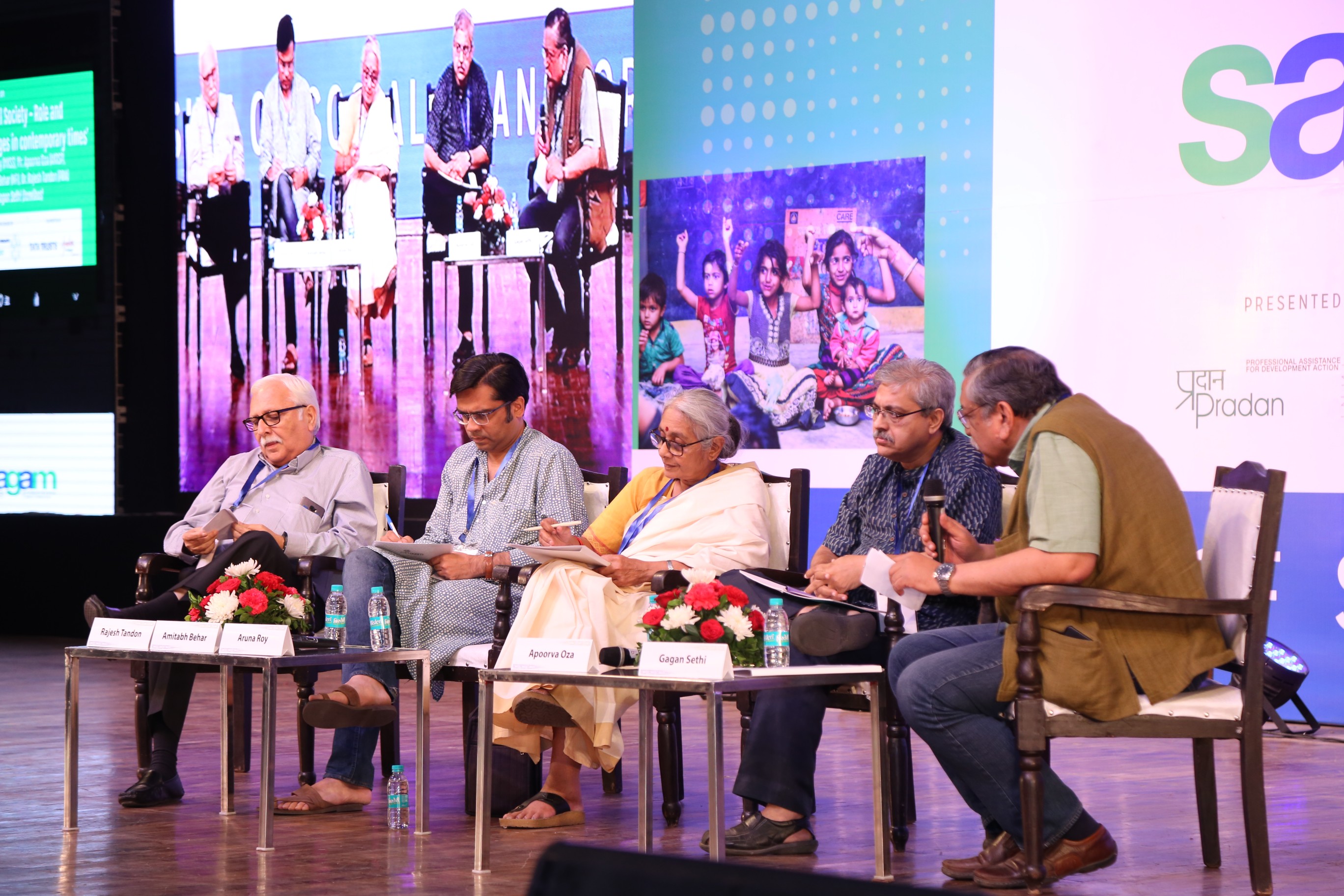 Apoorva Oza claimed that NGOs have all become players in multiple projects & grants. The ratio of transactional work to the transformational work that are being done is changing substantially. However, sometimes just organizing ourselves on a pluralistic way and getting people together, making them respect each other as human beings and overcoming the identities of religion and castes work a lot. The NGOs are seldom found in a position to bring this shift in their approach towards development. In fact they are hardly standing in solidarity and supporting each other at the times of crisis. Amitabh Behar, resonating with Aaruna Roy mentioned that the one of the most crucial roles of civil society in a democracy is completely about speaking truth to power and holding power accountable for everything that happens under its aegis. And in this respect the Indian civil society has been very shy. With the changing architecture of democracy, it is but essential to change the existing stance that adheres to the structures of 1980s. It calls for a paradigm shift in the approach and mindset of the civil society and adopt something that corresponds to the new, evolved face of Indian political structure and democracy.
Apoorva Oza claimed that NGOs have all become players in multiple projects & grants. The ratio of transactional work to the transformational work that are being done is changing substantially. However, sometimes just organizing ourselves on a pluralistic way and getting people together, making them respect each other as human beings and overcoming the identities of religion and castes work a lot. The NGOs are seldom found in a position to bring this shift in their approach towards development. In fact they are hardly standing in solidarity and supporting each other at the times of crisis. Amitabh Behar, resonating with Aaruna Roy mentioned that the one of the most crucial roles of civil society in a democracy is completely about speaking truth to power and holding power accountable for everything that happens under its aegis. And in this respect the Indian civil society has been very shy. With the changing architecture of democracy, it is but essential to change the existing stance that adheres to the structures of 1980s. It calls for a paradigm shift in the approach and mindset of the civil society and adopt something that corresponds to the new, evolved face of Indian political structure and democracy.
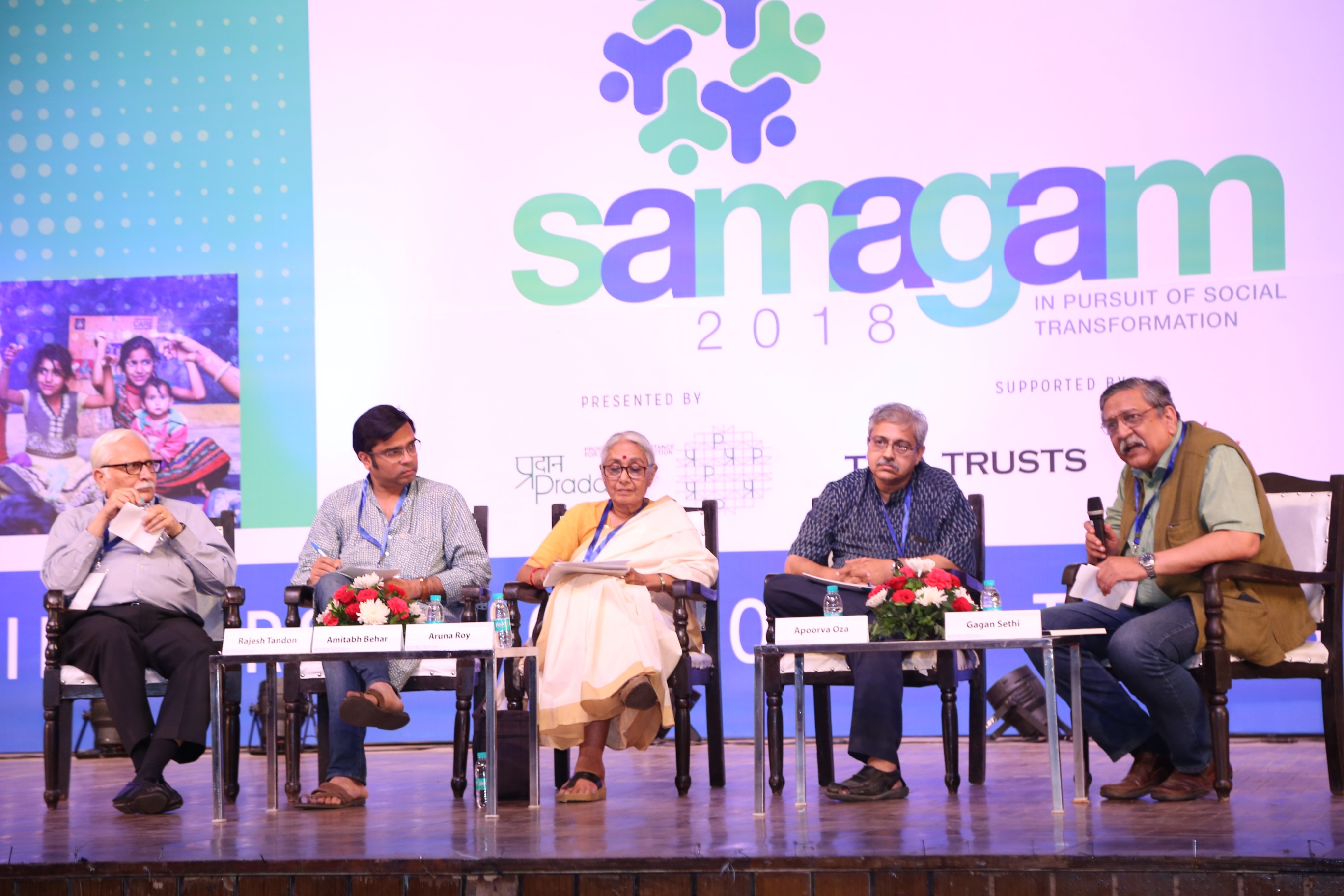 Talking about the future course of action and remedial measures for the ailments, the panel thus reinforced the need for CSOs to stand with each other as a united force in greater solidarity on issues of larger sectoral challenges, set out a set of non-negotialbles as far as civil society is concerned and reclaim the shrinking civic space. They highlighted the importance of platforms like Samagam to enable the civil society organisations to come together and take a unified stance and formulate future trajectory of concerted action. The space is not an exclusive one for the NGOs but a platform where the boundaries between the state, donor communities and the NGOs become bleak and all get an opportunity to speak in one voice and listen and learn from each other. However it is important to sensitise the donor community on the need for the NGOs to get supported for working beyond project commitments and confinements of key deliverables.
Talking about the future course of action and remedial measures for the ailments, the panel thus reinforced the need for CSOs to stand with each other as a united force in greater solidarity on issues of larger sectoral challenges, set out a set of non-negotialbles as far as civil society is concerned and reclaim the shrinking civic space. They highlighted the importance of platforms like Samagam to enable the civil society organisations to come together and take a unified stance and formulate future trajectory of concerted action. The space is not an exclusive one for the NGOs but a platform where the boundaries between the state, donor communities and the NGOs become bleak and all get an opportunity to speak in one voice and listen and learn from each other. However it is important to sensitise the donor community on the need for the NGOs to get supported for working beyond project commitments and confinements of key deliverables.
There is also a felt need to increase the number of actors in the civil society domain, the usually ignored ones e.g. teachers, Anganwadi and ASHA workers and several other people who are never considered a part of the civil society should also be justifiably included to further strengthen the united case. It was also buttressed that NGOs are operational in more or less every block of the country and doing many things beyond their projects. One of the duties of the organisations beyond fulfilling project demands is to start a conversation with youth in the small towns and raise various questions in their minds regarding employment, education, development etc. so that they are not misguided by the external powerful forces.
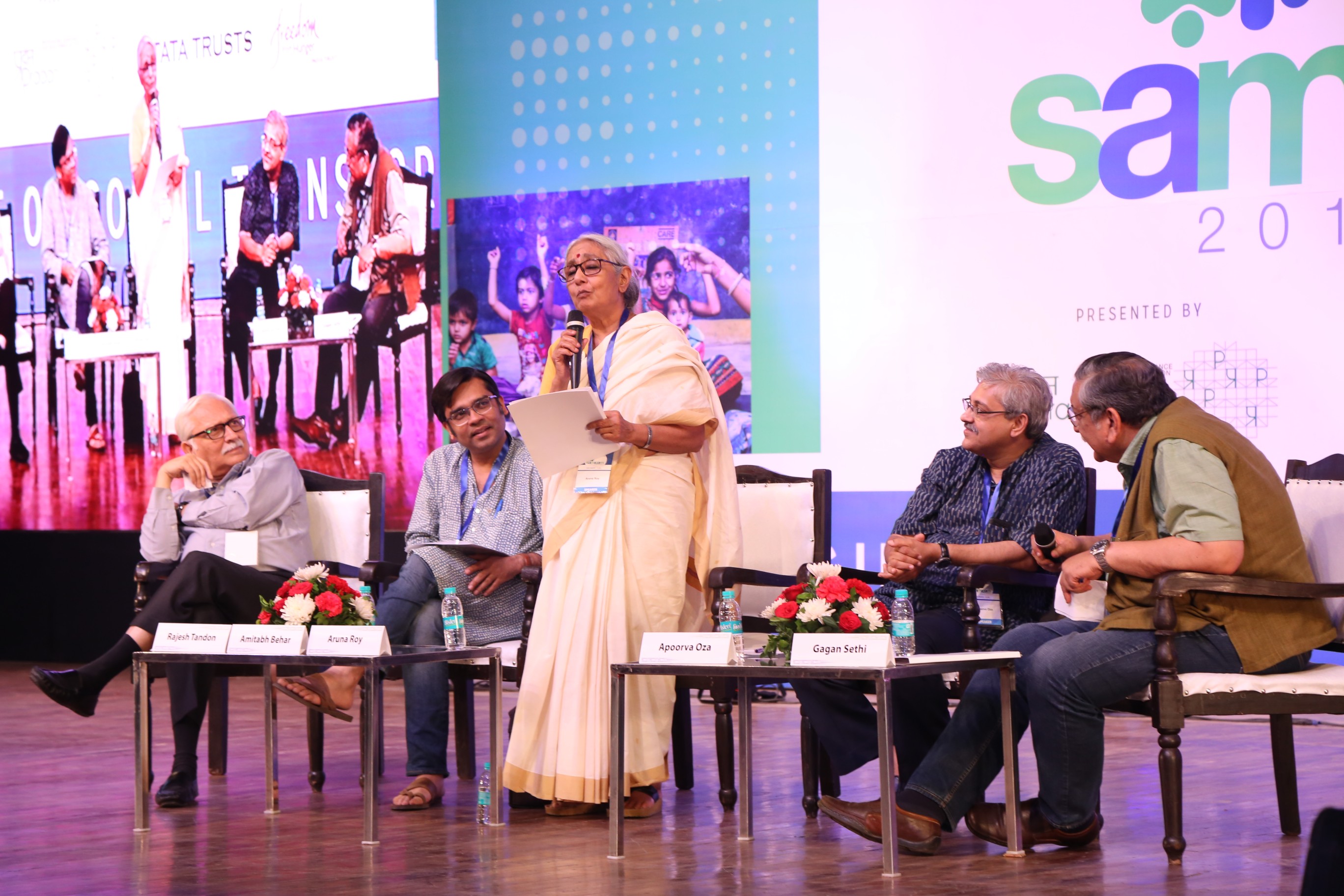 The next two panel sessions focussed on the relationship in between the CSOs and the donor agencies, mainly corporate and the State. It was in this regard that a book named ‘A Development Partnership to Emulate: PRADAN & ICCO’, co-authored by Dr. Prabhu Ghate and Pratyaya Jagannath Panda was launched documenting the nearly 30 years partnership between PRADAN and one of its donors – ICCO (Inter Church Organisation for Development Cooperation), the Netherlands. The book highlights the necessity of supporting NGOs by their donor partners with a perspective of building robust institutions and invigorating the development sector. This trend is dwindling. The essay very elaborately captures, “…ICCO does not, as a rule, look for short-term, project oriented partnerships, but rather long-term cooperation in which an agreed strategy underpins the common goal of working towards ending injustice against the poor and excluded groups of society. ICCO is required to take a look at the longer-term prospects of structural change and not just at the projected short-term results”. It “understands that Southern partners are autonomous organisations within their own societies and does not see them as channels for aid-delivery or project sub-contractors.” In other words, it adopts a partner rather than a project focus…” The abiding trust and patient capital that ICCO invested in PRADAN for about three decades paved way for a sustained growth of PRADAN as an institution of significance in the civil society sector. If PRADAN has considerably influenced many aspects of rural development thinking and practice today, through human resources groomed by PRADAN or developmental ideas, or management systems, it has been a result of long-term untied support provided by donors like ICCO.
The next two panel sessions focussed on the relationship in between the CSOs and the donor agencies, mainly corporate and the State. It was in this regard that a book named ‘A Development Partnership to Emulate: PRADAN & ICCO’, co-authored by Dr. Prabhu Ghate and Pratyaya Jagannath Panda was launched documenting the nearly 30 years partnership between PRADAN and one of its donors – ICCO (Inter Church Organisation for Development Cooperation), the Netherlands. The book highlights the necessity of supporting NGOs by their donor partners with a perspective of building robust institutions and invigorating the development sector. This trend is dwindling. The essay very elaborately captures, “…ICCO does not, as a rule, look for short-term, project oriented partnerships, but rather long-term cooperation in which an agreed strategy underpins the common goal of working towards ending injustice against the poor and excluded groups of society. ICCO is required to take a look at the longer-term prospects of structural change and not just at the projected short-term results”. It “understands that Southern partners are autonomous organisations within their own societies and does not see them as channels for aid-delivery or project sub-contractors.” In other words, it adopts a partner rather than a project focus…” The abiding trust and patient capital that ICCO invested in PRADAN for about three decades paved way for a sustained growth of PRADAN as an institution of significance in the civil society sector. If PRADAN has considerably influenced many aspects of rural development thinking and practice today, through human resources groomed by PRADAN or developmental ideas, or management systems, it has been a result of long-term untied support provided by donors like ICCO.
Panelists – Dhruvi Shah (Axis Bank Foundation); Vineet Nayar (Sampark Foundation); Rajiv Williams (Jindal Stainless Limited), and the session was chaired by Pramath Raj Sinha (Founder, Ashoka University).
While setting the tone for discussion, Pramath mentioned about the various expectations and excitements that exist around the volume of money available from various CSR initiatives. However, perpetual lack of clarity reigns on whom and how to approach for this two percent commitment. A lot of second guessing thus goes on and none knows how it is going to turn out for the benefit of the NGOs or last mile recipients. He called the session to be “an opportunity to hear from the other side and get their perspective in disbursing CSR funds and accessing CSR funds – the challenges and opportunities that one sees”. He invited the panellists to deliberate on the mindsets that govern the CSR investment decisions.
Dhruvi Shah, the first panellist in the session pointing out at the significance of the two percent mandate mentioned that lot of corporate entities who were not funding earlier for social responsibility initiatives were now compelled to start funding due to this bill and lots of new funders have come into the scenario. Therefore the quantum of money under this two percent pool is destined to increase by manifolds as the businesses make profit and their number proliferates. She highlighted the fact that Axis Bank Foundation, like several others, has been funding much before the bill was legislated. However, CSRs being associated with business ventures, the numbers become more important for them. But at the end of the day CSRs and NGOs both look at the same thing i.e. sustainably impact people’s lives and livelihoods. Recognising the importance of educating the CSRs through learnings from the fields, Dhruvi mentioned that there are silos between corporate funding and the intent of the development sector, and this creates the demand for a collaborative approach. There is an exigency to form a common platform with common language to bring both the parties on the same platform.
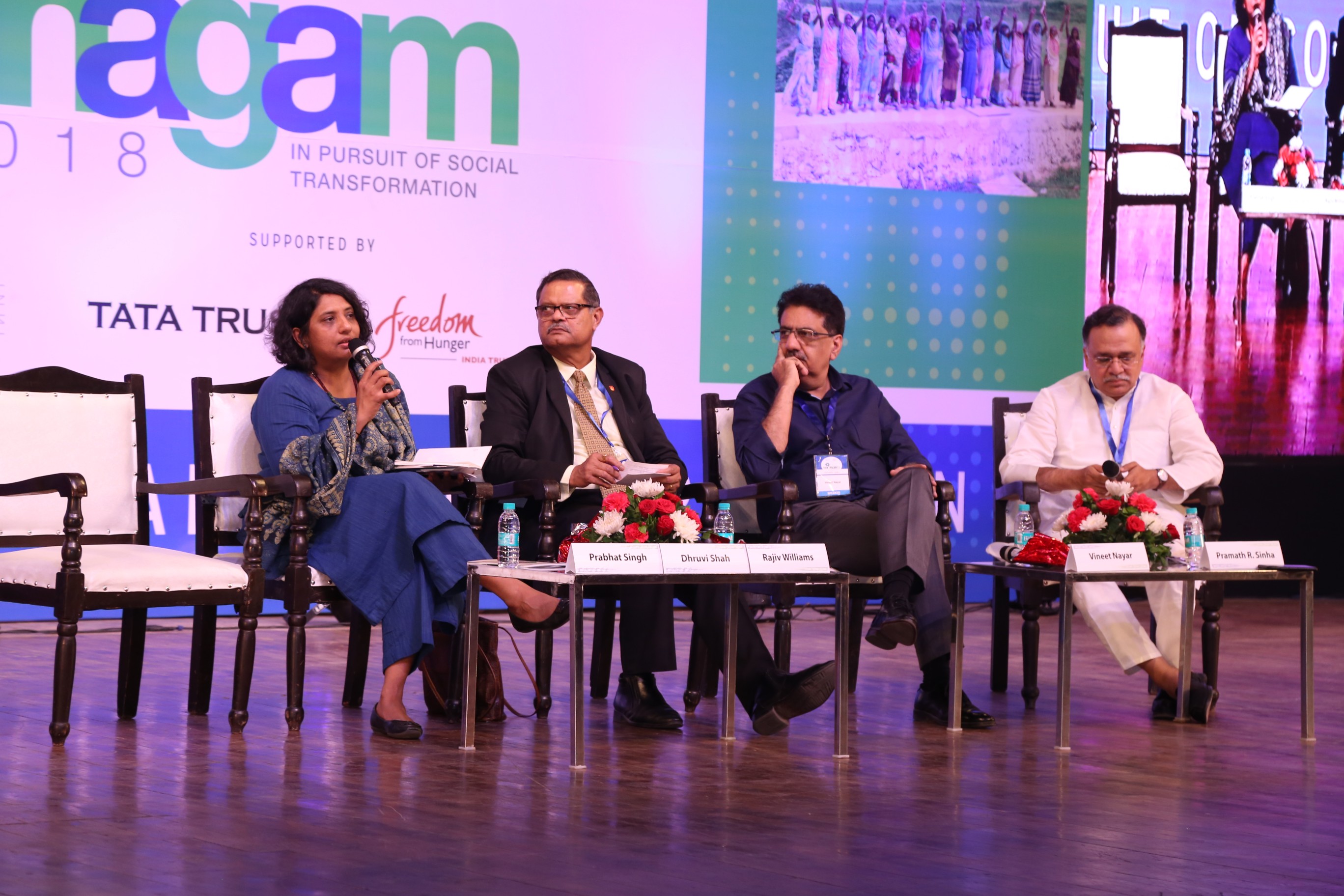 Rajiv Williams on his part focussed on the requirement for the CSRs to concentrate on the hinterlands of their plant areas rather than accommodating funding needs for any part of the country because their works, especially manufacturing, impact the population residing in those areas the most and they need assistance for leading a better life. At the same time he highlighted one major bottleneck that the CSRs are facing in terms of investing decisions when it comes to choose the implementing partner as many of these CSRs were not investing before this bill came. Alongside the big organisations like PRADAN which have got market credibility to their credit, there is a substantial number of NGOs who have weaker delivery models, thus leaving the corporate in dilemma about the outcome of their investment. So some of them are directly implementing their projects, while few have chosen to implement through hired teams who become part of the company and in many cases the CSRs outsource it to partners who have equal stake in developing and implementing a given project. There are not defined metrics to evaluate a partner NGO. Sharing the experience at Jindal Stainless Foundation Rajiv mentioned that their policy is to go by the word of mouth and personal experience. Rajiv reinforced the importance of attaining scale for project activities to make a change sustainable, but cautioned that quality in the cost of quantity is a over-run. So if one can demonstrate in a smaller geography and then the development organisations decide to go to scale with the support of the government, then it will be a successful experience.
Rajiv Williams on his part focussed on the requirement for the CSRs to concentrate on the hinterlands of their plant areas rather than accommodating funding needs for any part of the country because their works, especially manufacturing, impact the population residing in those areas the most and they need assistance for leading a better life. At the same time he highlighted one major bottleneck that the CSRs are facing in terms of investing decisions when it comes to choose the implementing partner as many of these CSRs were not investing before this bill came. Alongside the big organisations like PRADAN which have got market credibility to their credit, there is a substantial number of NGOs who have weaker delivery models, thus leaving the corporate in dilemma about the outcome of their investment. So some of them are directly implementing their projects, while few have chosen to implement through hired teams who become part of the company and in many cases the CSRs outsource it to partners who have equal stake in developing and implementing a given project. There are not defined metrics to evaluate a partner NGO. Sharing the experience at Jindal Stainless Foundation Rajiv mentioned that their policy is to go by the word of mouth and personal experience. Rajiv reinforced the importance of attaining scale for project activities to make a change sustainable, but cautioned that quality in the cost of quantity is a over-run. So if one can demonstrate in a smaller geography and then the development organisations decide to go to scale with the support of the government, then it will be a successful experience.
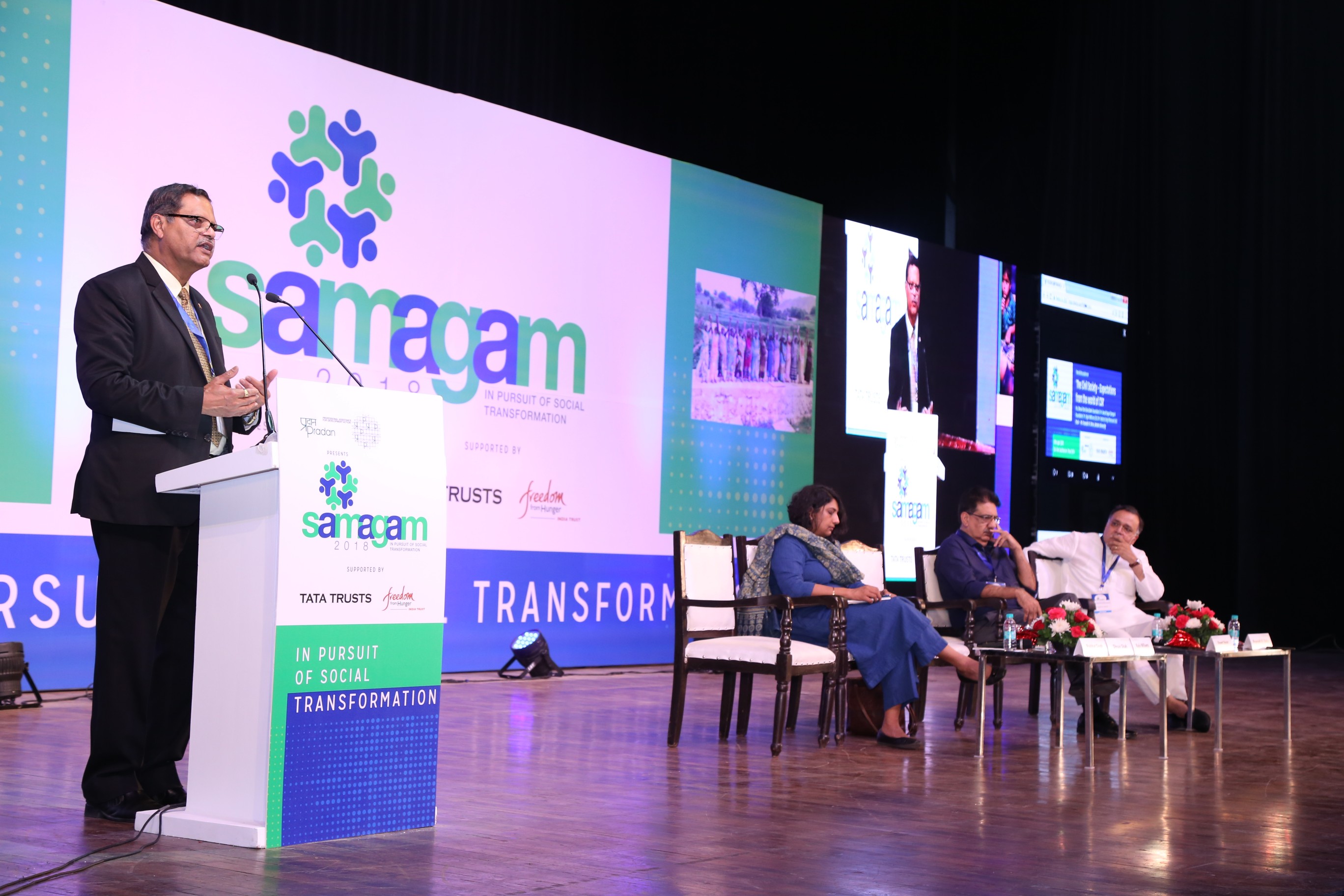 The third panellist of the session, Vineet Nayar began with an anecdote of his visit to one of the remote villages in Chhattisgarh during his stint as a member of PRADAN’s governing board. He mentioned that the visioning exercise with village women which PRADAN professionals facilitated was an eye-opener for him who has the wisdom and experience of running IT companies for 25 years and had done numerous visioning exercises himself. However, this one taught him a big lesson – ‘to bring the desired change, one needs to live the future in present tense.’
The third panellist of the session, Vineet Nayar began with an anecdote of his visit to one of the remote villages in Chhattisgarh during his stint as a member of PRADAN’s governing board. He mentioned that the visioning exercise with village women which PRADAN professionals facilitated was an eye-opener for him who has the wisdom and experience of running IT companies for 25 years and had done numerous visioning exercises himself. However, this one taught him a big lesson – ‘to bring the desired change, one needs to live the future in present tense.’
Sharing his take on the two percent mandate, Vineet expressed his apprehension about the IT companies’ spending the entire two percent of their profit on CSR initiatives. He negated the existence of any structured thought behind their CSR activities and pointed out that these typically happen on ad-hoc basis and choice of partners happen over words of mouth. Thus decision making are often found to lack the desired maturity. Secondly, commercial activities are less in poor rural areas spreading mainly across central India and the corporate are majorly based in urban/peri-urban areas. This results in lack of CSR funding opportunities in these areas where substantial number of poor people reside. The overarching focus on their plant areas, catering to their own communities that are affected by their commercial activities and thus the daunting task of reaching out to the actual poverty stricken population remains unfulfilled forever.
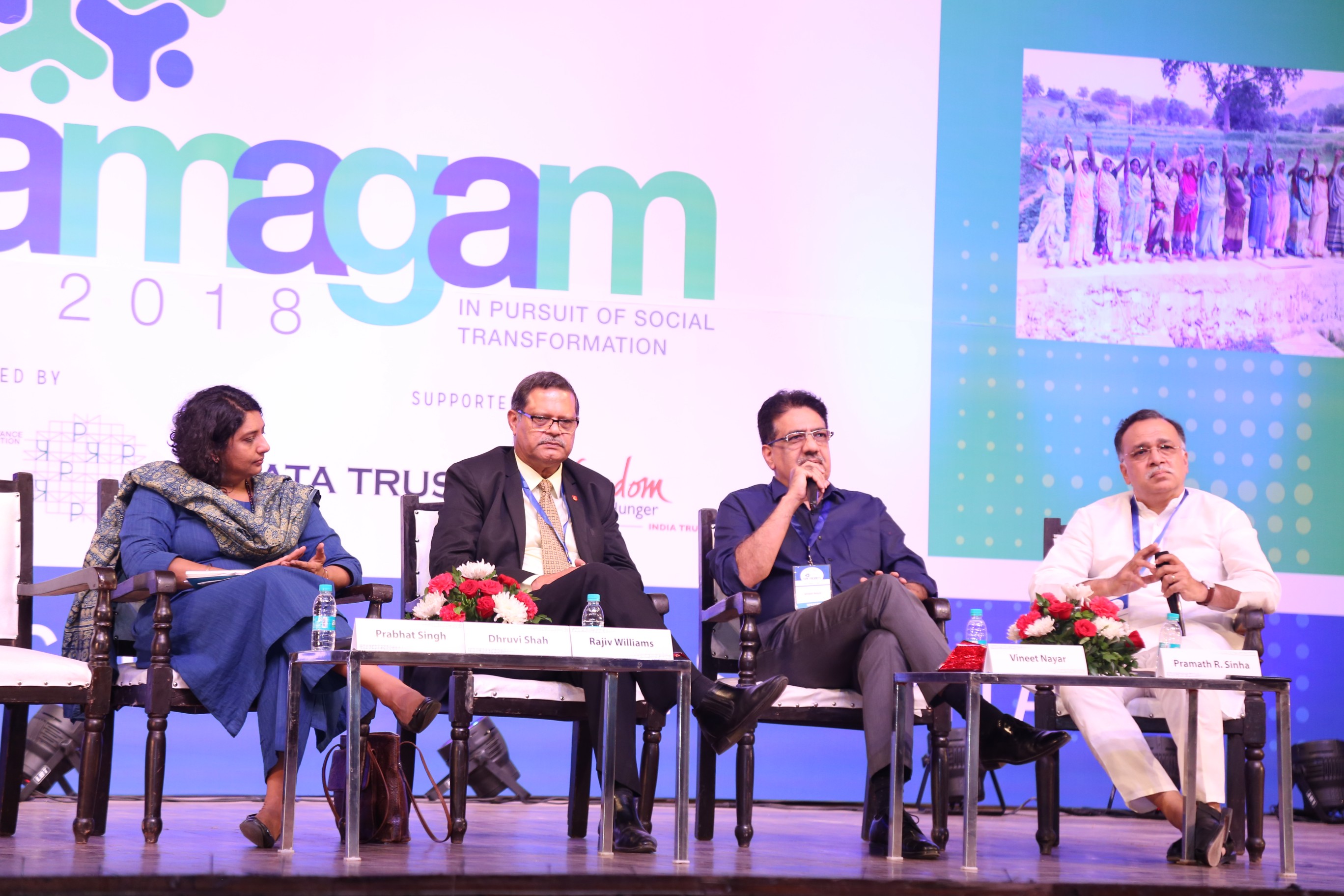 Resonating Dhruvi’s concern, Vineet reinstated that understanding situations through numbers is an inherent trait of the corporate sector; data is of supreme importance when it comes to decisions regarding investment and calculations of return on investment. On the other hand the social sector struggles to provide this data, as not every return in development terms can be captured through quantifiable data. This makes idea sharing between the two parties a clearly crucial factor. However, this by no means belittles the fact that the CSOs are organising themselves better and it will take some more time for them to come up with systems more streamlined as per the standards expected by corporate.
Resonating Dhruvi’s concern, Vineet reinstated that understanding situations through numbers is an inherent trait of the corporate sector; data is of supreme importance when it comes to decisions regarding investment and calculations of return on investment. On the other hand the social sector struggles to provide this data, as not every return in development terms can be captured through quantifiable data. This makes idea sharing between the two parties a clearly crucial factor. However, this by no means belittles the fact that the CSOs are organising themselves better and it will take some more time for them to come up with systems more streamlined as per the standards expected by corporate.
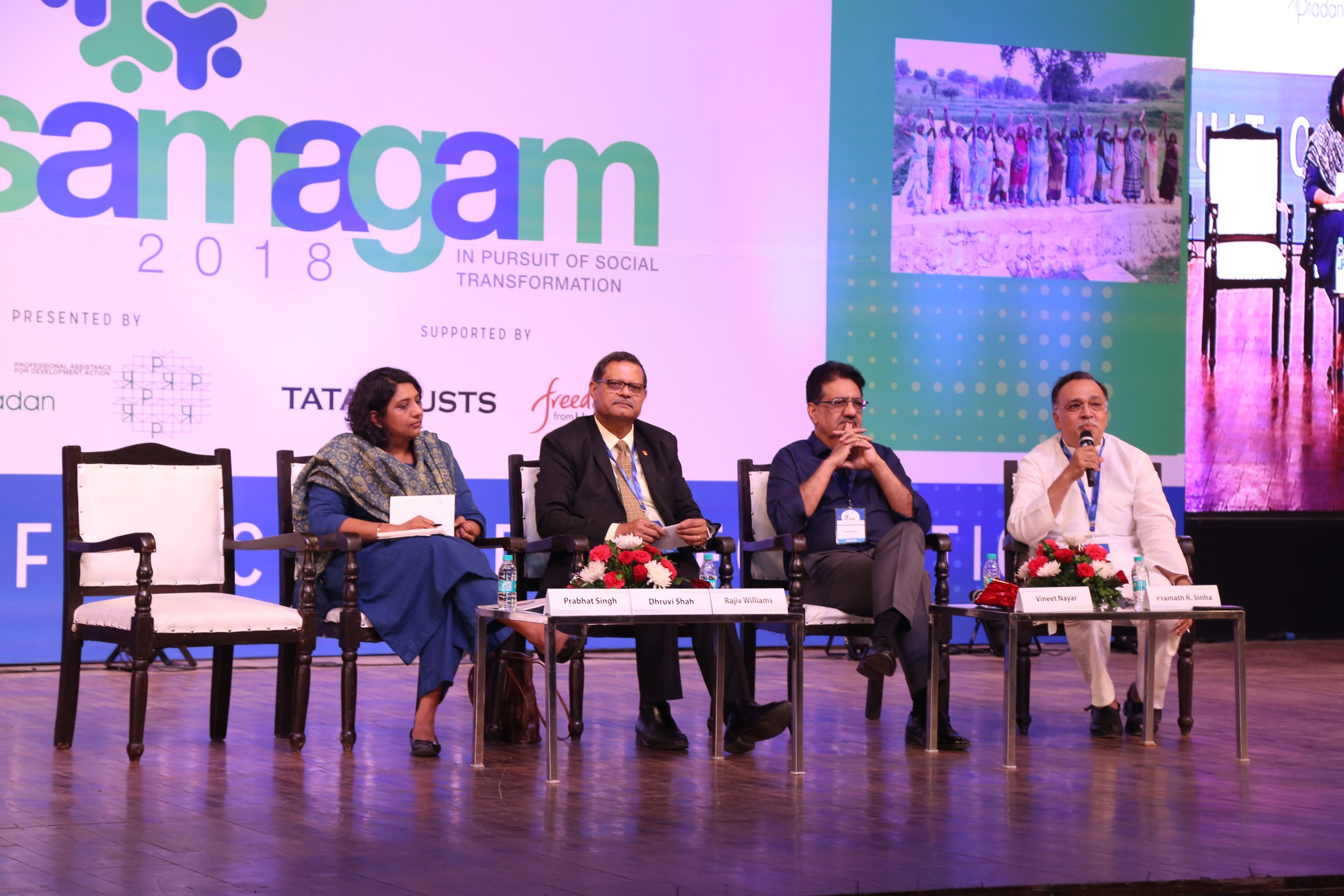 At this stint, promise from the world of CSR should be seen as a ten on ten opportunities. Global funding for change initiatives is dwindling as India is emerging and will continue to emerge in world economic sphere in the near future. So contribution from the Indian foundations is becoming more crucial as global foundations would find it difficult, if not completely irrelevant to fund development projects in India. Under this light the mandated two percent must be seen as guidance set forth by the government for the corporate sector to follow; but that is not mandatory and certainly it is not a straight two percent.
At this stint, promise from the world of CSR should be seen as a ten on ten opportunities. Global funding for change initiatives is dwindling as India is emerging and will continue to emerge in world economic sphere in the near future. So contribution from the Indian foundations is becoming more crucial as global foundations would find it difficult, if not completely irrelevant to fund development projects in India. Under this light the mandated two percent must be seen as guidance set forth by the government for the corporate sector to follow; but that is not mandatory and certainly it is not a straight two percent.
The panellists agreed on the importance of carrying out social responsibility work much beyond the realm of two percent mandated. They highlighted the importance of having a more comprehensive strategy and selection policy for CSR work implementation, working in partnership with NGOs who, as sector experts, could help corporate and funders make more educated investments.
Panellists – J R K Rao (Secretary, Minorities Commission), Ritu Sain (Additional Resident Commissioner, Chhattisgarh Bhawan, New Delhi), Sandeep Dikshit (ex-Parliamentarian), Guru Charan Naik (Afghanistan Resilience Consortium at Afghanaid), chaired by Sushil Ramola (B-ABLE).
Sushil Ramola set the ball rolling by creating the backdrop of the current situation where Civil Society has played a complementary, supportive role to the State for its development programs and implementation of the same, and yet the State and the Civil Society seem to be getting polarized in their approach to solving development issues. There seemed an apparent lack of trust between the two key stakeholders and it was important to find a way of them working together for the cause of social development in the country. It was in this context that Sushil invited the panelists to share their views on what role they envisaged of the Civil Society, and what challenges, if any, they faced while working with it.
Ritu Sain asserted that the ultimate goal of both the State and the Civil Society was the same – welfare of the people and good governance. She shared some of the key roles played by the Civil Society as perceived by the State which are ensuring mobilisation, capacity building and participation of the communities (including very remote and backward regions) for more effective dissemination of information and translation of policy into action. She feels that the State and the civil society help bring different perspectives, point-of-view and thinking on the table, but this certainly needs not to happen in a confrontationist mode. However Ritu shared that agenda of the NGOs can sometimes be too focused, narrow, or restrictive in the context of the overall development agenda of the State, and may need the State to keep the larger agenda in mind while engaging with NGOs working in the context of their narrow focus.
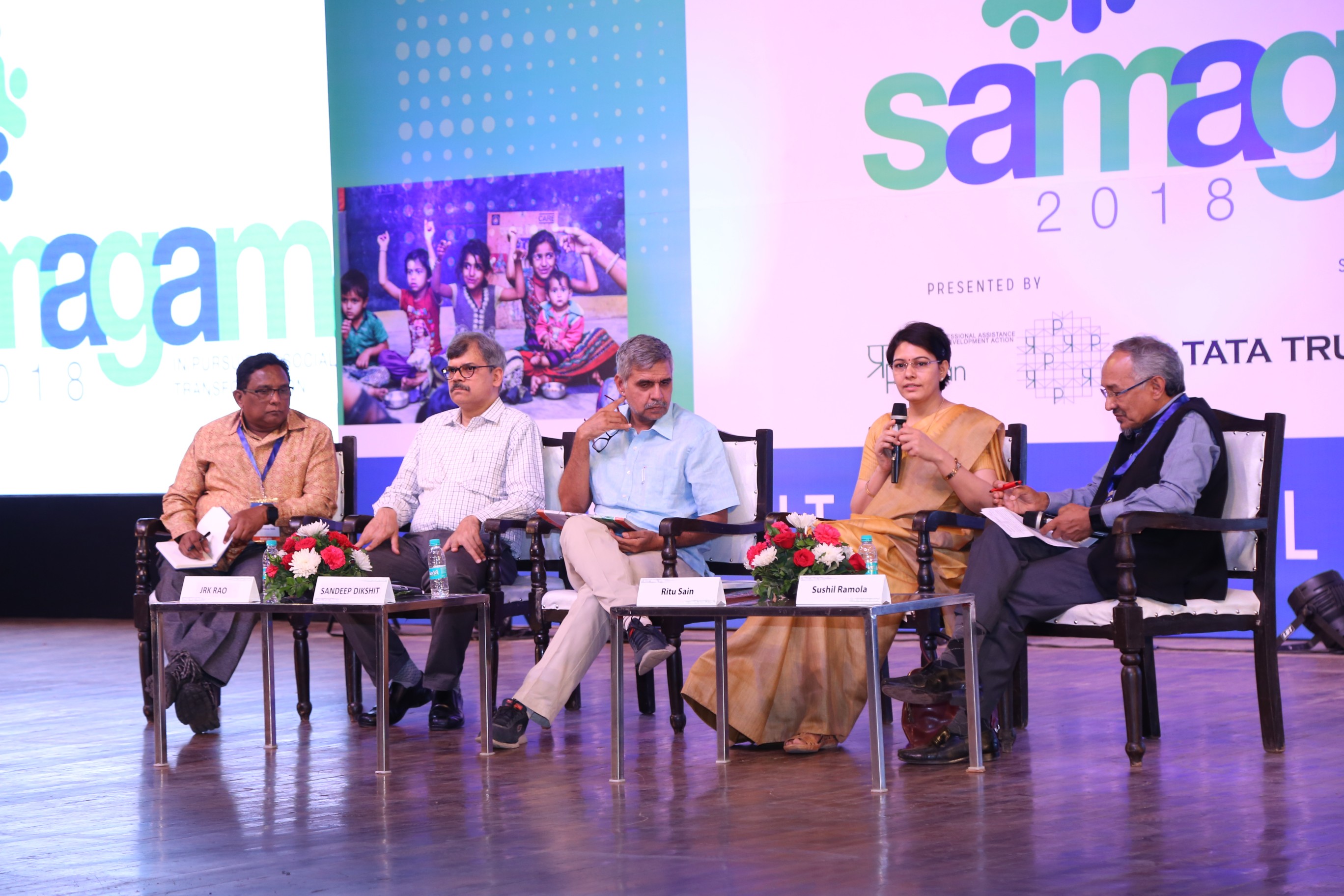 Sandeep Dikshit felt that State tended to look at the NGO sector with limited respect and a level of suspicion of professionals wanting to “interfere” in government policies. It was okay with civil society working within the State’s view of civil society’s role but discomfort sets in when civil society raises the communities’ stature from consumers of State policy to that of responsible, questioning citizens, demanding their rights and not just fulfilling their duties. The NGOs should however be ready to bear the pain and need for sacrifice, if required, to stand up to the State and get the citizens and the society their due.
Sandeep Dikshit felt that State tended to look at the NGO sector with limited respect and a level of suspicion of professionals wanting to “interfere” in government policies. It was okay with civil society working within the State’s view of civil society’s role but discomfort sets in when civil society raises the communities’ stature from consumers of State policy to that of responsible, questioning citizens, demanding their rights and not just fulfilling their duties. The NGOs should however be ready to bear the pain and need for sacrifice, if required, to stand up to the State and get the citizens and the society their due.
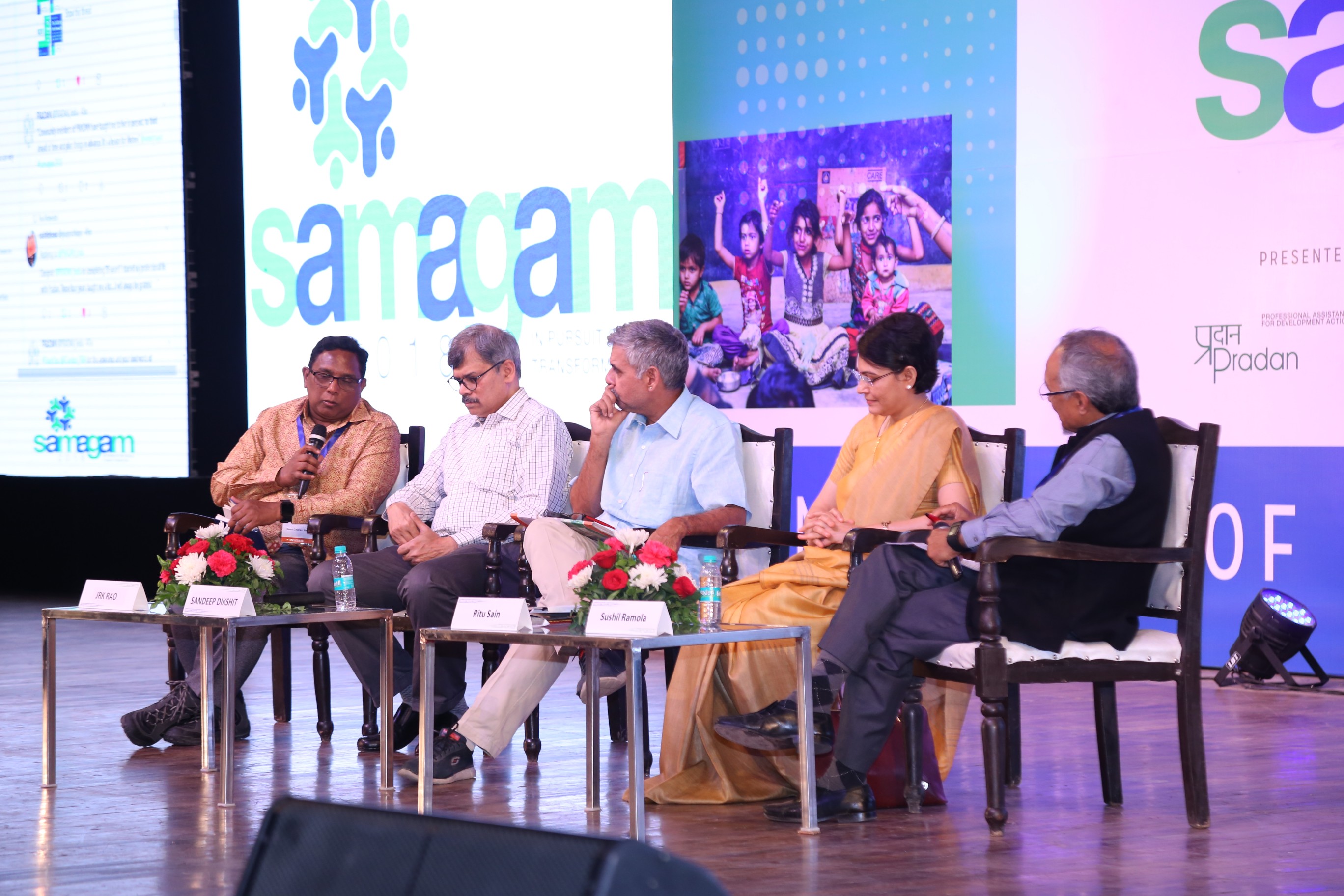 There was common agreement that State’s approach to development and attitude towards the civil society tended to be individual driven rather than constant across tenures of officials. Mr. JRK Rao also highlighted the point that State officials had not made the shift yet from being “regulators” to “facilitators” in the context of developing and implementing community policies and programs. The difference in motivation of pursuing the development agenda results in conflict between the State and the civil society. He however was extremely positive of the growing appreciation of the role of civil society by the State going forward, as the new breed of better educated, more sensitive, new generation administrators who had grown up in the era of liberalization took center stage. He also mentioned that developments on the IT and internet front which made raising of issues and crowd sourcing of ideas simpler and faster augurs well for the future of the civil society and makes for a more sensitive, responsive State, willing to work more closely with the civil society on development issues and things that matter to the citizens of the country.
There was common agreement that State’s approach to development and attitude towards the civil society tended to be individual driven rather than constant across tenures of officials. Mr. JRK Rao also highlighted the point that State officials had not made the shift yet from being “regulators” to “facilitators” in the context of developing and implementing community policies and programs. The difference in motivation of pursuing the development agenda results in conflict between the State and the civil society. He however was extremely positive of the growing appreciation of the role of civil society by the State going forward, as the new breed of better educated, more sensitive, new generation administrators who had grown up in the era of liberalization took center stage. He also mentioned that developments on the IT and internet front which made raising of issues and crowd sourcing of ideas simpler and faster augurs well for the future of the civil society and makes for a more sensitive, responsive State, willing to work more closely with the civil society on development issues and things that matter to the citizens of the country.
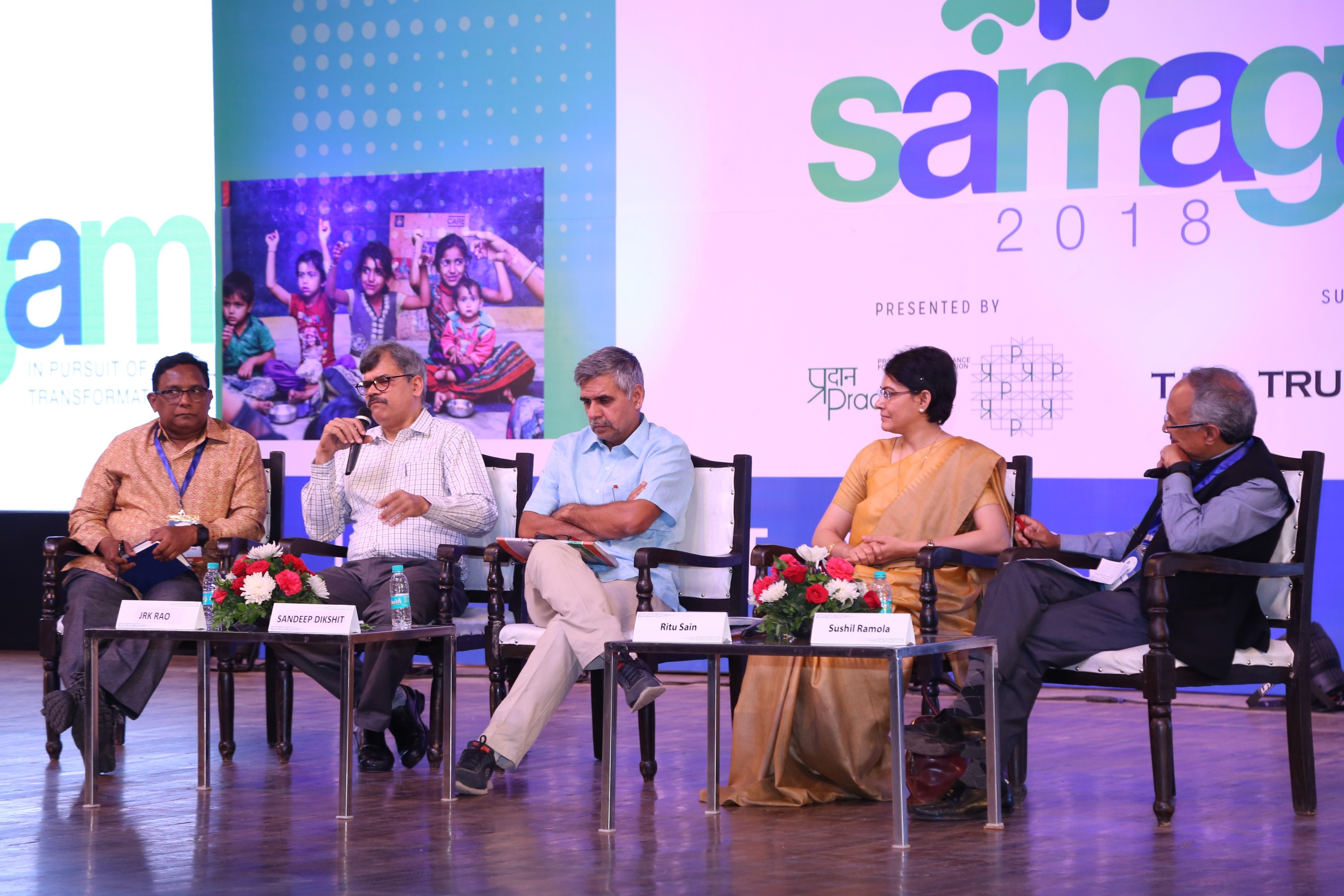 There was common agreement that State’s approach to development and attitude towards the civil society tended to be individual driven rather than constant across tenures of officials. Mr. JRK Rao also highlighted the point that State officials had not made the shift yet from being “regulators” to “facilitators” in the context of developing and implementing community policies and programs. The difference in motivation of pursuing the development agenda results in conflict between the State and the civil society. He however was extremely positive of the growing appreciation of the role of civil society by the State going forward, as the new breed of better educated, more sensitive, new generation administrators who had grown up in the era of liberalization took center stage. He also mentioned that developments on the IT and internet front which made raising of issues and crowd sourcing of ideas simpler and faster augurs well for the future of the civil society and makes for a more sensitive, responsive State, willing to work more closely with the civil society on development issues and things that matter to the citizens of the country.
There was common agreement that State’s approach to development and attitude towards the civil society tended to be individual driven rather than constant across tenures of officials. Mr. JRK Rao also highlighted the point that State officials had not made the shift yet from being “regulators” to “facilitators” in the context of developing and implementing community policies and programs. The difference in motivation of pursuing the development agenda results in conflict between the State and the civil society. He however was extremely positive of the growing appreciation of the role of civil society by the State going forward, as the new breed of better educated, more sensitive, new generation administrators who had grown up in the era of liberalization took center stage. He also mentioned that developments on the IT and internet front which made raising of issues and crowd sourcing of ideas simpler and faster augurs well for the future of the civil society and makes for a more sensitive, responsive State, willing to work more closely with the civil society on development issues and things that matter to the citizens of the country.
The panel agreed that the State and civil society could work towards having a symbiotic relationship and the civil society at its end may need to drive a “Common Minimum Program” with the State which defines roles and responsibilities for both stakeholders. Reinforcing the need for such collaboration between State and the civil society, the panellists pointed out that the State’s approach to development and attitude towards the civil society tended to be individual driven rather than constant across tenures of officials.
While summarising the day’s proceedings and hinting at the exigencies that the sector should focus upon, PRADAN co-founder Vijay Mahajan pointed out the relevance of re-writing the constitution of India by the youth. “We have to sit down like our founding fathers did in 1949 and remove some of the distortions that have come into our building of that great vision which was laid down in 1949 Constitution.” A body called ‘CIVIC’ (Citizens’ Initiative for Visioning India’s New Constitution) has been formed to translate the thought into action. Vijay also highlighted the need to allocate a bigger budget to the CSOs that are doing a majority of development work in India. “The 15th Finance Commission must take into account that if indeed civil society is a legitimate instrument of development and agent of change in this country, then just as we found it okay to tell the corporate sector to put two per cent of their net profits for CSR then there needs to be an earmark for civil society sector for one per cent of all government budgets that is spent on development. That is 30 billion US dollars which is roughly about Rs. 2 lakh crores.”
PRADAN co-founder Vijay Mahajan summarised the day’s proceedings and hinted at the exigencies that the sector should focus upon. He pointed out the relevance of re-writing the constitution of India by the youth. “We have to sit down like our founding fathers did in 1949 and remove some of the distortions that have come into our building of that great vision which was laid down in 1949 Constitution.” A body called ‘CIVIC’ (Citizens’ Initiative for Visioning India’s New Constitution) has been formed to translate the thought into action. Vijay also highlighted the need to allocate a bigger budget to the CSOs that are doing a majority of development work in India. “The 15th Finance Commission must take into account that if indeed civil society is a legitimate instrument of development and agent of change in this country, then just as we found it okay to tell the corporate sector to put two per cent of their net profits for CSR then there needs to be an earmark for civil society sector for one per cent of all government budgets that is spent on development. That is 30 billion US dollars which is roughly about Rs. 2 lakh crores.”

